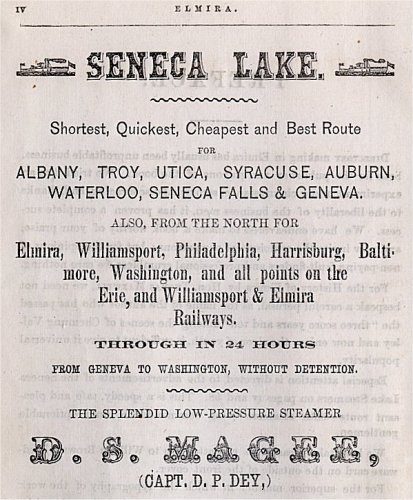 |
Directories of Chemung County, New York |
 |
|
|
|
|
|
|
|
 |
|
Written for the Pioneer’s Historical Festival at Owego, February 22, 1855
By C.L. Ward, esq., of Towanda, PA.
We’ll wake a plain old fashioned muse
Upon this festal day.
And sing of scenes and talk of times
Which long since passed away:
As thus we’ve met, ‘t is well to take
A retrospective view,
And note what changes have been wrought
Since this, our land, was new.
Then-all agree, without dispute,
To call Ohio "West";
And did not dream of world’s beyond,
But were content to rest
Amid these smiling vales of ours,
Where sugar-maple grew.
So here we reared our forest homes,
When this our land was new.
Ours was a brave and gallant band,
Well fitted for each toil,
And soon we let the sunbeams in
Upon a generous soil;
Strong were the hands, and strong the hearts.
Of that widely-gathered few,
Who conquered here, old forests grand,
When this our land was new.
Dark danger lurked around each cot,
The red men in their wrath
Lay coiled like silent serpents,
Along each greenwood path;
Or shouted loud their battle-cry,
As over hill and glen they flew-
Ah! Those were "times that tried men’s souls!"
When this our land was new.
The gaunt wolf’s howl and panther’s scream,
Made hideous every night,
And wives and youthful maiden’s hearts
Oft trembled with affright;
Until at length they learned to share
That courage stern and true,
Which throbbed in every manly breast,
When this our land was new.
War’s storm swept past, and gentle peace
With silent blessings comes,
And fills with hopes and gladness
Our wood embosomed homes;
And neighbor, then, toward neighbor
In friendship closely drew,
So we lived a band of brothers,
When this our land was new.
No party feuds, or politics,
Much marred our rural joys,
One hope engrossed each female heart,
And nerved the men and boys.
To clear a farm-adorn a home-
Was most they had in view.
We’d no foreign frips or fopperies,
When this our land was new.
The girls all learned to make good bread,
While like their spinning-wheels,
Right merry ran their sinless songs,
Without piano peals.
And blithely did they dance at night,
E’en when they staid till two-
Such were the only stays they wrought,
When this our land was new.
Most wore a linsey-woolsey dress,
Their own sweet hands had made,
With a blue and white checked apron
That would not tear or fade;
The rich brocades and rustling silks,
Were seldom brought to view,
Except "to go to meetin’" in,
When this our land was new.
Five yards were ample for a dress,
Few ever asked for more,
And never trailed their skirts along
The dirty streets or floor.
They looked as neat and tidy then,
As any one of you
Who scorn the homespun, which was worn
When this our land was new.
We seldom saw consumption then,
With its pallor and its pall,
‘Twas rounded cheeks, and Health’s own bloom,
That greeted every call.
Each foot a home-knit stocking wore,
A home-made calfskin shoe,
And there’s certain things-girls didn’t wear,
When this our land was new.
Good, wholesome and substantial food,
Our festive tables crowned;
No French nick-nack or luxury,
In our bills of fare was found;
But labor sweetned every dish,
And what is better too,
We needed no "Maine Liquor Law"
When this our land was new.
Yes! Things have changed, there’s little left
Of plain old-fashioned truth,
All dream of princely riches now,
E’en from their very youth;
And Schuyler shifts, and scoundrel schemes,
Rise frequently to view,]
And make us mourn those pure "old times"
When this our land was new.
To half the folks Ohio’s East!
Missouri’s at the best,
A kind of half-way resting place
To those who’re going West.
Pacific States were all the rage
Until the late ado,
No Kansas or Nebraska is
The only land that’s new.
Millions are blest and blessing now,
Where sixty years agone,
The poor untutored Indian roamed
A monarch, and alone;
The iron-horse with fire and fright,
Whirls quick the country through,
Where we wagged "many a weary foot"
When this our land was new.
Our women no more spin and weave,
In which we’re all agreed,
With patent rights and power-looms
There is no longer need;
But then for bread they give us Stone,
Or do us Brown or blue,
They did not then put Bloomers on,
When this our land was new.
But enough of retrospection,
And the changes which have come,
To each and all around us.
Bringing joy or bringing gloom;
And, let’s raise our thoughts in sadness,
Before we say adieu!
In memory of our loved and lost
Since this ourland was new.
The Whitneys, Platts, and Robinsons,
Pumpellys, Averys, Gores,
The Franklins, Maxwells, Spaldings,
The Welles and the Moores,
The Satterleees and Hollenbacks,
Rosses and Tuttles too,
Who blessed with dauntless energies
This land, when it was new.
God rest them! In their last low homes,
With all their brave compeers,
Who fought and bled, or toiled and strove,
Through weary, lingering years,
That thus their sons, in prosperous peace,
Could pleasantly review
The many changes time has wrought,
Since this our land was new.